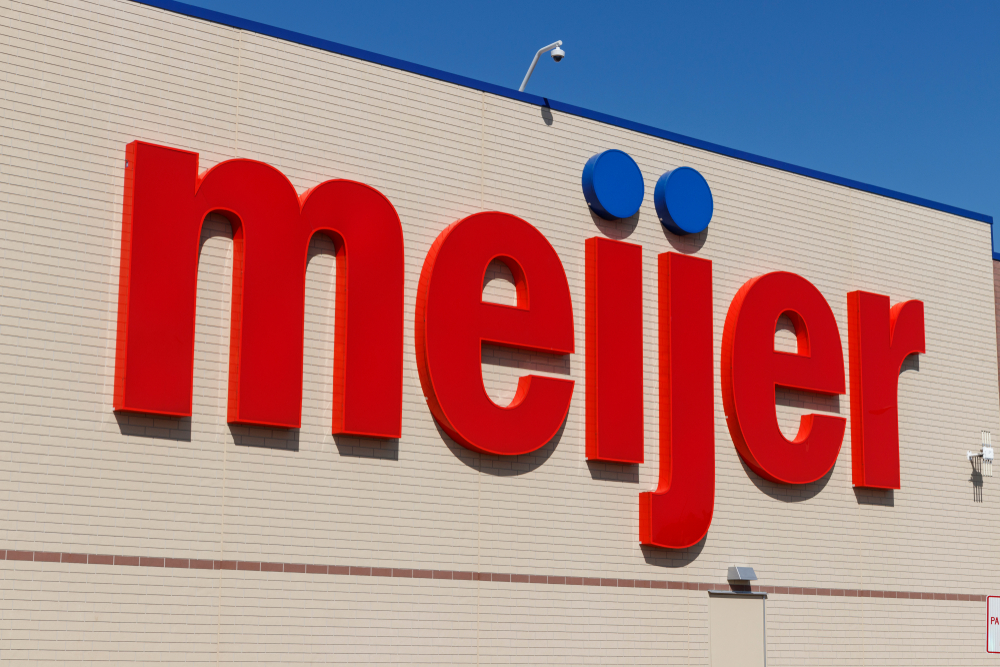This article is proudly sponsored by Sew Torn, a film by Diamantis Zavitsanos!
What Meijer Should Do Over the Next 5 Years (Or… Just Sell the Whole Thing?)
Meijer is a Midwestern private grocery marvel.
100% Family-owned. Supercenter style. Competent. Beloved by moms and coupon snipers alike.
But while it’s one of the largest private retailers in America, it’s also facing an increasingly brutal reality:
- Walmart’s a hydra with rollback pricing.
- Amazon’s coming for your paper towels.
- Aldi’s got people excited about private-label hummus.
So—what’s Meijer supposed to do?
Well, they’ve got two options, in my opinion:
- Go beast mode and reinvent themselves for the next decade.
- Just… get bought out and cash in the loyalty card.
Let’s explore both routes.
Option 1: Stay Independent—and Play to Win
If Meijer wants to survive (and thrive) as an independent, it needs to stop playing defense and start swinging.
1. Build a Killer Private Label Brand
Everyone else has one. Aldi’s whole identity is private label. Walmart’s Great Value is a suburban staple. Even Costco’s Kirkland has fans with tattoos.
Meijer? It has True Goodness, Purple Cow, and some okay mac and cheese. But not a cult brand.
What to do:
- Invest in ONE flagship private-label brand.
- Focus on 20–30 “hero” SKUs that beat name brands.
- Wrap it all in Midwest pride. (“Built for Big Ten winters” = yes.)
2. Reinvent the Supercenter (Before It Reinvents Irrelevance)
The old model—huge stores packed with groceries + toasters—feels dated. Meijer needs to reclaim that square footage.
What to do:
- Turn extra space into:
- Micro-fulfillment centers
- Meal prep kitchens
- Local brand incubators
- Pilot smaller, urban store formats like Target and Kroger
Let’s be honest—if it’s just rows of microwaves and fishing tackle, Amazon already wins.
3. Win Digital—Without Losing the Local Feel
Curbside pickup? Sure. App? Exists. But nobody’s raving about Meijer’s tech stack.
What to do:
- Revamp MPerks into a true digital loyalty hub
- Offer same-day delivery across core markets
- Use white-labeled tech (Instacart/DoorDash) instead of trying to code from scratch
The goal: Make digital feel local.
4. Dominate Health, Wellness, and Ready-to-Eat
People want to eat better. They also want someone else to do the chopping.
What to do:
- Build chef-prepared, heat-and-eat meals (think Whole Foods meets Meijer pricing)
- In-app meal planning and health nudges
- Launch a weekly dinner subscription box—pickup in-store or delivered via van
5. Don’t Compete on Scale—Partner on Value
Meijer can’t out-Amazon Amazon. But it can do what Walmart can’t: act fast, act local, and meaningfully collaborate.
What to do:
- Partner with Midwest farms, makers, and startups
- Create exclusive limited-run products like Aldi does
- Bring in third-party services (think medical clinics, subscription refill kiosks, etc.)
Summary: Meijer’s “Stay Independent” Playbook
| Focus Area | Move | Why It Works |
| Private Label | One standout brand | Loyalty + margin + brand identity |
| Store Footprint | Smaller formats + reuse space | Reduces bloat, increases relevance |
| Digital | Modernize, don’t overbuild | Catch up fast without burning cash |
| Prepared Food | Own convenience + wellness | Lock in repeat visits and sticky spend |
| Partnerships | Collaborate, don’t compete | Extends reach and adds moat layers |
Option 2: Just Sell the Thing—But to the Right Buyer
Now let’s flip it: What if Meijer doesn’t want to evolve? What if the family just says, “We’ve had a great run—let’s go play golf”?
Here’s who would make the most strategic buyer—and why.
1. Amazon – The Ruthless but Rational Pick
Amazon’s grocery effort is… not great. Meijer could be its missing puzzle piece in the Midwest.
Why this works:
- Meijer gives Amazon instant physical footprint + cold storage
- Combines regional trust with Amazon’s tech machine
- Turns Meijer into a Midwest Prime powerhouse
Risks:
- Major cultural mismatch
- Alexa in every aisle could trigger a “Not in my Michigan” movement
2. Walmart – The Monopoly Megaplay
Walmart would love to crush a rival—and Meijer is prime meat.
Why this works:
- Locks down Midwest dominance
- Instantly absorbs a regional foe
But don’t count on it:
- FTC would nuke this in court
- Meijer’s brand dies in the process
3. Target – The Sneaky Smart Fit
Midwest darlings. Similar vibes. Different strengths.
Why this works:
- Target stinks at grocery—Meijer is a grocery machine
- Meijer lacks flash—Target oozes brand equity
- Combined = Trader Joe’s scale meets Whole Foods-lite
This is the most culturally aligned and operationally synergistic combo on the list.
4. Kroger – The Logistics Play
Kroger and Meijer operate in overlapping lanes–and with that, given what happened with its attempted acquisition of Albertsons, this deal probably wouldn’t get approved. Combined, they’d have Walmart-worrying scale.
Pros:
- Meijer’s non-grocery goods = upside
- Shared systems = backend synergy
Cons:
- Could feel like merging two “meh”s
- May alienate loyalists if not done carefully
5. Private Equity – Fast Cash, Big Risk
You know the drill:
- KKR, Blackstone, Berkshire… they’d all look at Meijer’s EBITDA and salivate
- They’d buy it, cut costs, boost margins, flip it in 5 years
Pro: Big payday
Con: The Meijer you know and love dies quietly by year 3
So… What Should Meijer Actually Do?
- If they want legacy, control, and relevance, they need to double down on innovation—private label, digital, and health-forward retail.
- If they want to cash out, the Target acquisition path offers the cleanest cultural match and strategic upside—without selling out to the dark side.
Either way, drifting sideways is no longer an appealing option.
DISCLAIMER: This analysis of the aforementioned stock security is in no way to be construed, understood, or seen as formal, professional, or any other form of investment advice. We are simply expressing our opinions regarding a publicly traded entity.
© 2025 MacroHint.com. All rights reserved.
